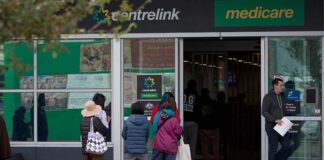“I have to navigate the household budget like a big monopoly game—taking from one area, getting bills stalled, asking for supports for my children wherever I can …
“I do not know how I will pay the difference in this quarter’s electricity gas and food bills (on credit card), that have increased by well over 30 per cent during lockdown.”
That’s the reality of life for Nicole, a sole mother of three children, one of whom became critically ill.
She is among millions who will struggle to put food on the table this Christmas, let alone buy presents for loved ones.
Her story is told in a new report by the Australian Council of Social Service (ACOSS), titled Faces of Unemployment.
It records that in August there were six unemployed or under-employed people for every job vacancy.
By September, with half the country under lockdown, the effective unemployment rate (which takes into account people stood down or who have left the labour force) was 9.5 per cent or twice the official headline figure.
ACOSS has found that while media headlines talk of worker shortages, long-term unemployed people have found it harder than those who were briefly jobless.
It writes: “Businesses and jobs do not instantly ‘snap back’ when lockdowns are lifted. The jobs created and restored aren’t always suitable for the people who are searching for employment.
“They may not live where the jobs are located; they may not have the skills required; and many will be understandably fearful of taking on public-facing jobs due to COVID-19.”
In June, there were 1,109,000 people receiving unemployment payments, 31 per cent more than before the pandemic.
More than 897,000 of them had been on income support for more than a year, and 547,000 for more than two years.
Many of these people are older, have a disability, come from a culturally diverse background, are caring for young children, in most cases as sole parents, or are Indigenous.
Food banks
Researchers at the Brotherhood of St Laurence (BSL) have found similar patterns, with no snap-back for people on the lowest incomes during a lull in the pandemic last summer.
“As government supports such as the Coronavirus Supplement were gradually withdrawn, many people were plunged (back) into poverty.
“Workers in affected industries continued to face challenges making ends meet, with employment and work-hours remaining below the pre-COVID level.
“Many who had drawn upon savings or taken on debt to get through the crisis faced a long rebuilding process to get back to their pre-crisis financial position,” the BSL researchers wrote.
Food banks were seeing demand soaring long before the pandemic.
OzHarvest, an organisation that distributes free food, gave out 3 million meals in 2011—this year it distributed 36 million.
“We saw these stats rising pre-COVID,” said CEO Ronni Kahn. “It’s not a problem that’s going away because COVID might come to an end … These are long-term, endemic challenges.”
Meanwhile rising inflation (hitting an annual rate of 3 per cent in the September quarter) means life is getting tougher for all workers—with or without a job.
The rocketing price of petrol leads the way, but there have also been big price increases for beef, pre-school and primary school fees, furniture, public transport fares and much more.
During the initial peak of the pandemic in 2020, the government effectively abolished poverty by doubling JobSeeker.
The money is still there. The government gave at least $13.8 billion in JobKeeper to profitable companies, allowing them to boost profits and executive bonuses.
And corporate profits have boomed, reaching a record high of $123 billion in the September quarter of this year.
Unions and community groups need to step up the campaign for JobSeeker to be raised from $45 to $80 a day, with higher payments for other welfare recipients, such as pensioners.
And workers need to organise and fight in the new year for wage rises that are higher than inflation.
Striking back is the answer to poverty.
By David Glanz






